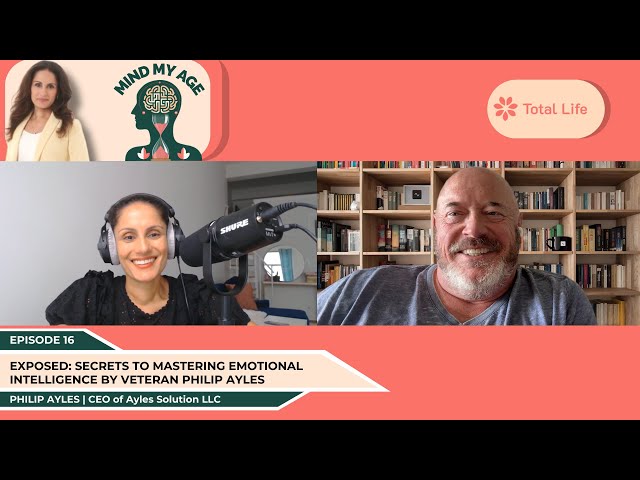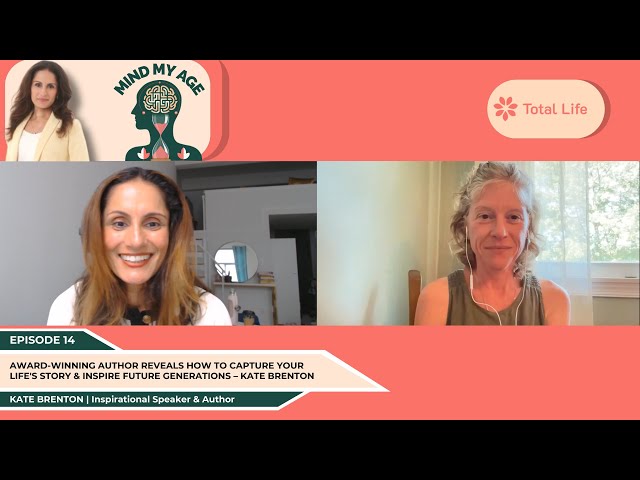In this episode of Mind My Age, presented by Total Life, host Neelam Brar engages in a dialogue with Dr. Ginette Collazo, a renowned expert in human error reduction and cognitive performance. They explore the complexities of human behavior, shedding light on how emotions sway decision-making, productivity, and health. Dr. Collazo imparts practical wisdom on grasping and managing cognitive limitations, particularly for the elderly. This blog distills the conversation’s essence, providing readers with insights into enhancing daily life by minimizing errors and fostering emotional regulation.
How You Feel Shapes Your Life
Dr. Collazo commences by underscoring the significance of self-awareness in recognizing the influence of emotions on our decisions and productivity. She states that acknowledging the role of emotions empowers individuals to control their decision-making processes. “Attempt to live your life as if you were 21, understanding that life’s gravity is not as severe,” she suggests, advocating for maintaining a perspective amidst life’s challenges.
Decision-Making and Emotional Regulation
Many mistakes we make each day stem from emotions clouding our judgment. Dr. Collazo advises listeners to pause, reflect, and remove emotional bias when making major decisions. “Remove emotional bias, create a list of non-negotiables, and adhere to them,” she advises. By stripping emotions from decision-making, individuals can make more rational, impulsive-free choices.
The Sunk Cost Fallacy
One concept Dr. Collazo explores in depth is the sunk cost fallacy, where people continue investing time, money, or energy into failing endeavors simply because of past investments. She encourages listeners to recognize when the benefits no longer justify the costs and to have the courage to pivot when necessary. “Sometimes, we must disengage from situations where the benefits do not justify the efforts,” she states. Her counsel serves as a reminder that it’s acceptable to redirect efforts toward more promising opportunities.
Environment Design for Success
Creating environments that minimize errors is pivotal to Dr. Collazo’s work. She emphasizes how our surroundings significantly impact our success. From physical environments to mental checklists, thoughtful design can reduce mistakes and enhance productivity. “We make mistakes because our systems and environments permit it,” she explains, urging listeners to optimize their spaces for healthier, more productive living. Simple adjustments, such as decluttering or setting alarms, can significantly reduce human error.
Human Error in Everyday Life
Memory, attention, and cognitive load often decline as we age, leading to increased errors in daily tasks. Dr. Collazo stresses the importance of using checklists, alarms, and reminders to combat forgetfulness and ensure safety. “We are overconfident in our ability to multitask and remember, but we shouldn’t be. Make checklists for your new best friend,” she says. These tools are particularly beneficial for older adults who may be more prone to errors due to cognitive decline.
Safety and Habits in Everyday Life
Dr. Collazo shares practical tips for reducing safety risks, especially for seniors. She encourages listeners to predict potential hazards in their homes and daily routines and to implement “barriers of defense” to prevent accidents.
“Predict what could go wrong and put barriers of defense in place,” she advises, offering strategies like decluttering spaces, ensuring proper lighting, and creating a more structured daily routine.
Human Error & Cognitive Performance
The discussion also introduces the idea that human errors are inevitable but manageable. Her work focuses on understanding human performance and cognitive limitations to reduce these errors in everyday life. “We cannot alter the human condition, but we can alter the conditions in which humans work and live,” she explains, offering hope that individuals can lead safer, more productive lives with the right strategies and awareness.
Common Errors We Make Daily
Poor decision-making often stems from emotional pressure, leading to rushed choices and the persistence of failed endeavors. Practicing emotional awareness and taking time to slow down can mitigate these errors. Suggestions include sleeping on significant decisions, identifying non-negotiables, and seeking objective input from a therapist.
A powerful example of pivoting from one project to another is shared, highlighting a personal experience of shifting from software development to AI-based solutions after realizing the initial investment was not worth pursuing further.
Dr. Ginette Collazo shares a compelling anecdote about pivoting from a software development project to an AI-based solution mid-project. This decision was made after realizing the original plan was not worth the investment. This pivot exemplifies her approach to reducing errors and optimizing performance.
Designing Your Environment for Success
There are practical steps for reducing error, including designing environments that promote success. She advocates for decluttering physical spaces, setting reminders, and minimizing distractions. She illustrates these principles with examples from her home, where she prioritizes safety by keeping cupboards closed and monitoring stove safety.
For aging adults, she emphasizes the importance of creating safe and conducive environments for better decision-making. This approach is crucial for reducing errors and enhancing overall well-being.
Dealing with Cognitive Decline
The conversation then shifts to the impact of technology on cognitive performance, noting a significant decline in memory capacity. She attributes this to over-reliance on gadgets. To combat this, she recommends engaging in memory exercises and creating systems, like checklists, to reduce memory reliance.
Memory as a Muscle
“Memory is a muscle. You’ve got to exercise it,” Dr. Collazo recounts a personal experience where her memory recall was tested during an interview. She emphasizes the importance of exercising memory like a muscle. Practical tips include recalling meals from the past week or engaging in puzzles and memory games to keep memory sharp.
 The Role of Checklists in Everyday Life
The Role of Checklists in Everyday Life
Checklists are a simple yet powerful tool for reducing errors and staying organized. Dr. Collazo stresses their importance in daily routines, such as taking medication or packing for trips. She advises updating checklists and removing unnecessary items to maintain trust in the system.
Managing Caregiving and Cognitive Health
Dr. Collazo suggests using protocols and checklists to prevent errors in caregiving duties and reduce mental load. She also stresses the importance of cognitive health, noting that regular routines can improve memory and increase self-confidence. She reminds listeners that the best person to take care of them is themselves, encouraging proactive self-care.
Mental Health as a Foundation for Physical Well-Being
The connection between mental and physical health is profound. Improving mental health can alleviate physical symptoms often associated with stress, such as headaches or stomach problems. Therapy is highlighted as a valuable resource for identifying emotional triggers and improving coping mechanisms. “Mental health not only is a big problem but also affects your biology,” illustrates the critical role mental well-being plays in overall health.
Finding the Root Cause of Emotions
Understanding the root causes of emotions, such as anger or shame, is vital to better emotional regulation. Dr. Collazo explains that these feelings often stem from deeper-rooted emotions like fear. Individuals can better manage their reactions and improve their mental health by identifying these primary emotions. Tools like the emotion wheel can help people break down complex emotions into their core origins.
Motivation and Habit Transformation
Motivation is crucial for habit formation and life improvement. Dr. Collazo encourages listeners to identify their motivations, such as health goals tied to family milestones, and keep these in mind to fuel healthy habits. She advises finding what’s important to you and putting that in front of your mind.
People can sustain their motivation and achieve lasting change by tying goals to deeper personal meaning.
Conclusion
The conversation with Dr. Ginette Collazo offers valuable insights into improving memory, reducing human error, and understanding the profound connection between mental and physical health. Individuals can lead healthier, more productive lives by designing environments that support success, using checklists to stay organized, and addressing the root causes of emotions.
Dr. Collazo’s message is clear: while we can’t change human nature, we can change how we approach our daily lives to reduce errors and optimize performance. For anyone looking to improve their well-being, her advice offers practical steps to take control of their environment, emotions, and health. If you haven’t yet explored therapy, consider it a valuable mental and physical health tool, as Dr. Collazo advocates for its universal benefits.



 The Role of Checklists in Everyday Life
The Role of Checklists in Everyday Life





